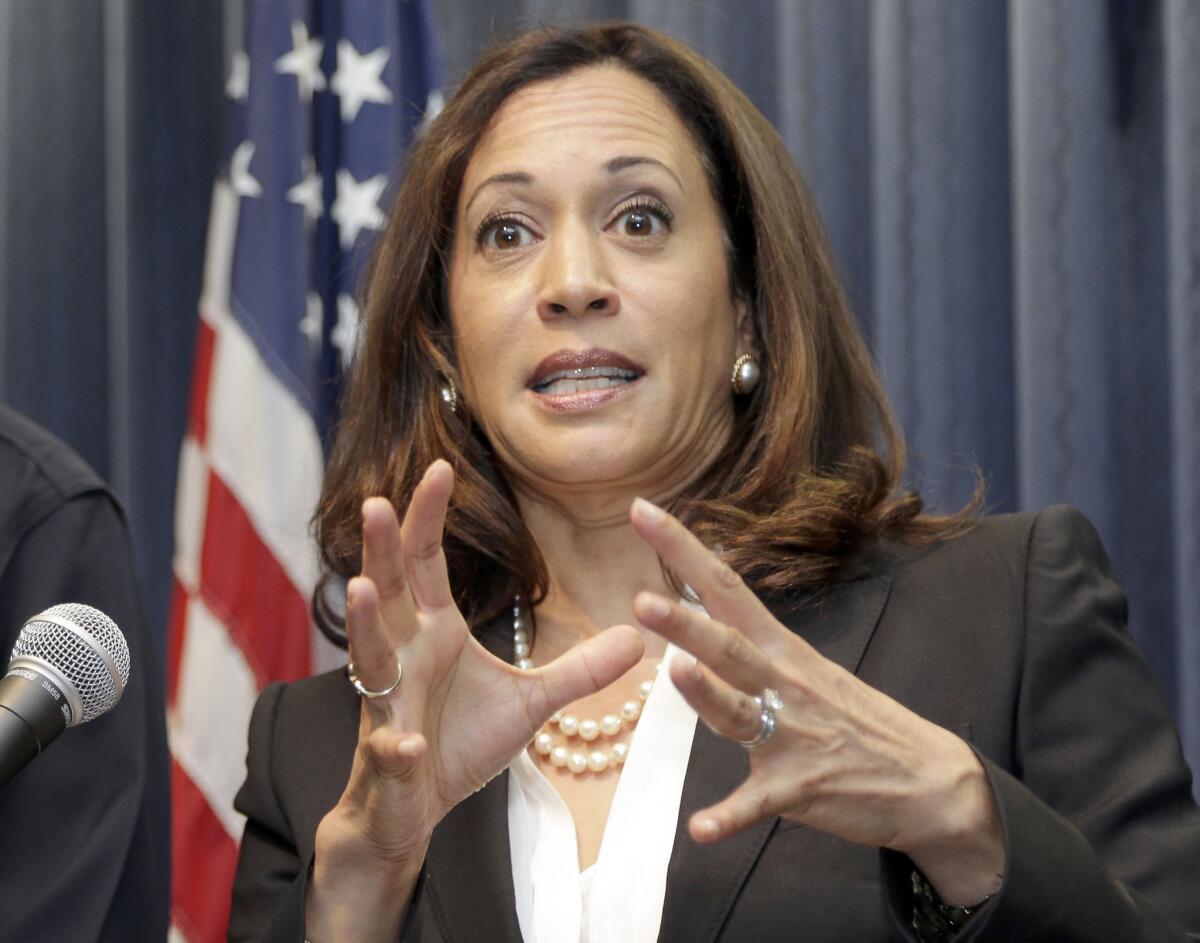Endorsement: Kamala Harris will be a fine replacement for Barbara Boxer — if she can keep her focus on the job

California Attorney General Kamala Harris speaks at a news conference in Los Angeles in September of 2015.
- Share via
Two undeniable facts about the race to succeed Barbara Boxer in the U.S. Senate: It’s been decidedly dull so far. And it’s been dull even though there are 34 candidates on the ballot.
Certainly, the Senate race has been overshadowed by the wild-and-crazy presidential primaries, which have defied prediction and common sense time and again. The leading Senate candidates, by contrast, have hewed for the most part to the usual party lines.
But another reason there’s been so little attention paid to the Senate race — the first open Senate seat in California in more than 20 years — is that there’s a sense of inevitability about the outcome. Even most of the candidates acknowledge that California Atty. Gen. Kamala Harris is expected to be the top vote-getter in the first round and that the real race is for second place, to challenge Harris again in November.
That sense of inevitability isn’t unwarranted. Harris was the first to enter the race, just days after Boxer announced her retirement. Harris has the state Democratic Party endorsement, and has raised three times as much money as her nearest competitor. What’s more, Harris is the strongest candidate in a field that is wide but not deep.
The Times recommends Harris, who is the candidate most likely to become the thoughtful, persuasive voice California needs in D.C. — if she’s willing to throw herself fully into the job, rather than working with one eye always focused on her next career step.
Harris is likely to become a thoughtful, persuasive voice California needs in D.C. - if she’s willing to throw herself into the job, rather than focusing on her next career step.
She is a former district attorney of San Francisco, who narrowly won her race for attorney general in 2010. As a rising star in the Democratic Party, she was given a prime-time speech at the 2012 Democratic convention and was even rumored as a possible successor to Justice Antonin Scalia. She would be the first black and the first South Asian senator from California.
When she met with The Times editorial board, Harris declared that California needs bold leaders. And she’s certainly capable of boldness. When other states reached a settlement with banks accused of improper mortgage foreclosures, Harris balked at what she saw as an unsatisfactory deal. She ultimately won greater debt reduction for homeowners and a larger award for damages. She also fought for a Homeowner Bill of Rights to ensure fair lending and borrowing practices, against strong opposition by banks.
But too often, Harris has been cautious and calculated to a fault, perhaps to avoid mistakes that could impede her political rise. She literally wrote the book on criminal justice reform — “Smart on Crime,” which came out in 2009. Yet she sat on the sidelines while Gov. Jerry Brown implemented his critically important “realignment” policy, shifting low-level offenders from state prison to county jail and probation.
When California voters were considering Proposition 47, another dramatic criminal justice reform initiative that reduced certain drug, theft and other felonies to misdemeanors, Harris refused to take a position. Her voice was missing at a time when it was most needed. Later, she failed to take a leadership role in the law’s implementation.
The Times is backing Harris, but we’d like to see her focus on the job and take the bold stands she says California needs.
Rep. Loretta Sanchez (D-Orange) has often stepped into controversy — intentionally and unintentionally. She embarrassed party leaders by scheduling a fundraiser at the Playboy Mansion during the Democratic convention in 2000. She had to apologize during the current race after making a stereotypical Native American “war cry” gesture. It would be easier to overlook Sanchez’s unfiltered style if she had a more impressive track record during her 20 years in Congress. She is a solid member who has worked across the aisle on defense and national security issues — and she voted against the Iraq war. But she hasn’t authored significant bills or stood out as a leader in the California delegation.
Republican Duf Sundheim is a former state GOP chairman who supports same-sex marriage and a pathway to citizenship for undocumented immigrants. But he’s never held office and is untested. Republican Silicon Valley multimillionaire Ron Unz’s unconventional thinking ignores party ideology; he backs a higher minimum wage and a path to citizenship, but wants to cap legal immigration and opposes affirmative action. By his own admission, he’s in the race to get publicity for his pet cause — defeating a ballot measure to repeal Proposition 227, which barred bilingual education in California. Another former state GOP chairman, Tom Del Beccaro, is a small-government, flat-tax, conservative Republican. There are 29 other candidates and the Times interviewed most of them, but few have the policy ideas and political or life experience to be a U.S. senator.
Follow the Opinion section on Twitter @latimesopinion and Facebook
More to Read
A cure for the common opinion
Get thought-provoking perspectives with our weekly newsletter.
You may occasionally receive promotional content from the Los Angeles Times.










